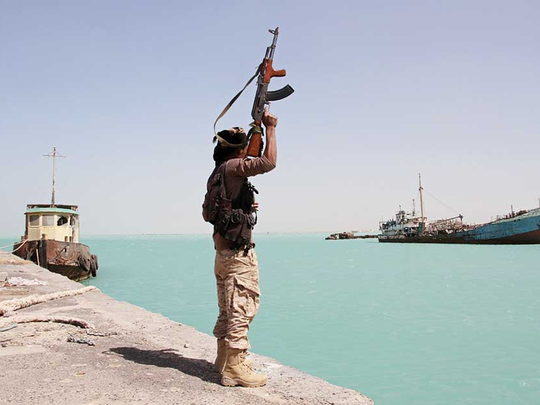
London: Saudi Arabia took the extraordinary measure of temporarily suspending oil shipments through the Bab Al Mandeb Strait after two tankers came under attack by Yemen’s Iran-allied Al Houthi militia on Wednesday.
The two vessels, each carrying two million barrels of oil, belong to the Saudi National Shipping Co, Energy Minister Khalid Al Falih said in a statement posted online. One of the two was hit and suffered minor damage; there were no injuries or oil spills as a result.
In the interest of the safety of ships and their crews and to avoid the risk of oil spill, Saudi Aramco has temporarily halted all oil shipments through Bab Al Mandeb with immediate effect, Al Falih said.
Saudi Arabia has been fighting with Al Houthi militia in Yemen for more than three years.
UAE Minister of State for Foreign Affairs Dr Anwar Gargash tweeted: “The targeting of two Saudi oil tankers in the Red Sea reaffirms the need to liberate Hodeida from the Al Houthi militia. The systematic attack on maritime navigation is a terrorist act that exposes the [true] nature of Al Houthis and their aggression.”
Yemeni Vice-President Ali Mohsin Al Ahmar said Al Houthis carried out a deliberate terror attack to disrupt maritime traffic and hinder peace efforts.
According to the official Yemeni news agency, Al Ahmar said the repeated targeting of shipping lines in international waters by Al Houthis obstructs the UN-led peace process. He accused Al Houthis of using Hodeida port to launch terror attacks.
The coalition launched an offensive in June to wrest Yemen’s main port of Hodeida from Al Houthis in a bid to cut off the primary supply line of the militia, which continues to occupy the capital Sana’a.
Earlier this month, the alliance called a halt to the offensive to give UN efforts a chance to reach a political solution that would avert an assault on the port, a lifeline for millions of Yemenis.
The Bab Al Mandeb Strait, off the coast of Yemen, Djibouti, and Eritrea, connects the Red Sea with the Arabian Sea and is one of the world’s key shipping lanes for crude oil and other petroleum products. The strait allows for crude exports into the European market via either the Sumed pipeline that links the Red Sea with the Mediterranean through Egypt or the Suez Canal.
A full closure of the strait, which at its narrowest point is just 29km wide, would force tankers sailing from Saudi Arabia, Kuwait, Iraq and the UAE “around the southern tip of Africa, which would add to transit time and cost,” according to the US Energy Information Administration.
Saudi Arabia can still use its East-West mega-pipeline to ship crude from its oilfields in the Arabian Gulf into the city of Yanbu on the Red Sea, bypassing the strait and keeping the European market within regular reach. The East-West pipeline has a capacity of about five million barrels a day.
While important for global oil flows, Bab Al Mandeb is significantly less crucial than the more famous Strait of Hormuz offshore Iran, which in 2016 saw the shipment of 18.5 million barrels a day, according to the EIA. Iran’s revolutionary guard has threatened to halt shipments via Hormuz in response to US sanctions.
Aramco, the Saudi state-owned company, kept the flow open through the narrower Strait of Hormuz during the 1984-1988 period of the Iran-Iraq war called the tanker war, when both countries attacked vessels in the Arabian Gulf, and also during the 1990-91 first Gulf War.












